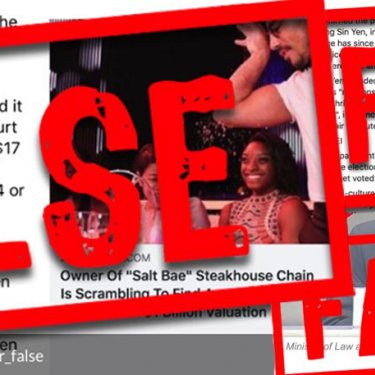Singapore uses “anti-fake news” law to eliminate public debate

Reporters Without Borders (RSF) is appalled by the totalitarian aspects of Singapore’s new, highly controversial “anti-fake news” law, under which the authorities issued two directives ordering “corrections” to Facebook posts within the space of a week.
The “corrections” are posted on a government web page called “Factually” that was up and running as soon as the law, the Protection from Online Falsehood and Manipulation Act (POFMA), took effect in October. This page claims to present the “correct facts” as opposed to what the law calls “online falsehoods and manipulation” and displays each “corrected” item with the word “FALSE” stamped on it in large red letters.
The first directive was sent by the finance minister on 21 November to an opposition politician who had posted a note on Facebook questioning the investments made by two Singaporean sovereign wealth funds. It forced him to post a “Correction notice” at the top of his post with a link to the government web page with the “correct facts.”
A second directive was issued two days later, this time by law and home affairs minister K. Shanmugan. It ordered Alex Tan, a journalist responsible for the States Times Review blog on Facebook, to “correct” an article reporting that a whistleblower had been arrested in Singapore in connection with revelations about a ruling party candidate.
After Tan, who lives in Sydney, refused to comply, the government pressured Facebook to take down the student web page that Tan cited as a source. Facing a possible fine of 1 million Singaporean dollars (660,000 euros), Facebook did remove the page, albeit on the grounds that it violated its “authenticity policies” - because it had allegedly misused the official student union’s name.
“Ministry of Truth”
“The Singaporean government’s recourse to this ‘anti-fake news’ law is a very worrying violation of journalistic pluralism and independence,” said Daniel Bastard, the head of RSF’s Asia-Pacific desk.
“In both of these cases the authorities could have disputed the claims they disagreed with and, in the process, could have contributed to the public debate, which is what happens in a democracy. Instead, the city-state government preferred to impose its own vision of the ‘facts.’ In so doing, it acted exactly like an Orwellian Ministry of Truth and, on the grounds of preventing online manipulation, simply imposed its own manipulation of public opinion."
Last April, RSF published an analysis of the draft version of this law, saying it had the potential to be a horrifying tool for censorship and intimidation.
Singapore is ranked 151st out of 180 countries in RSF’s 2019 World Press Freedom Index.



